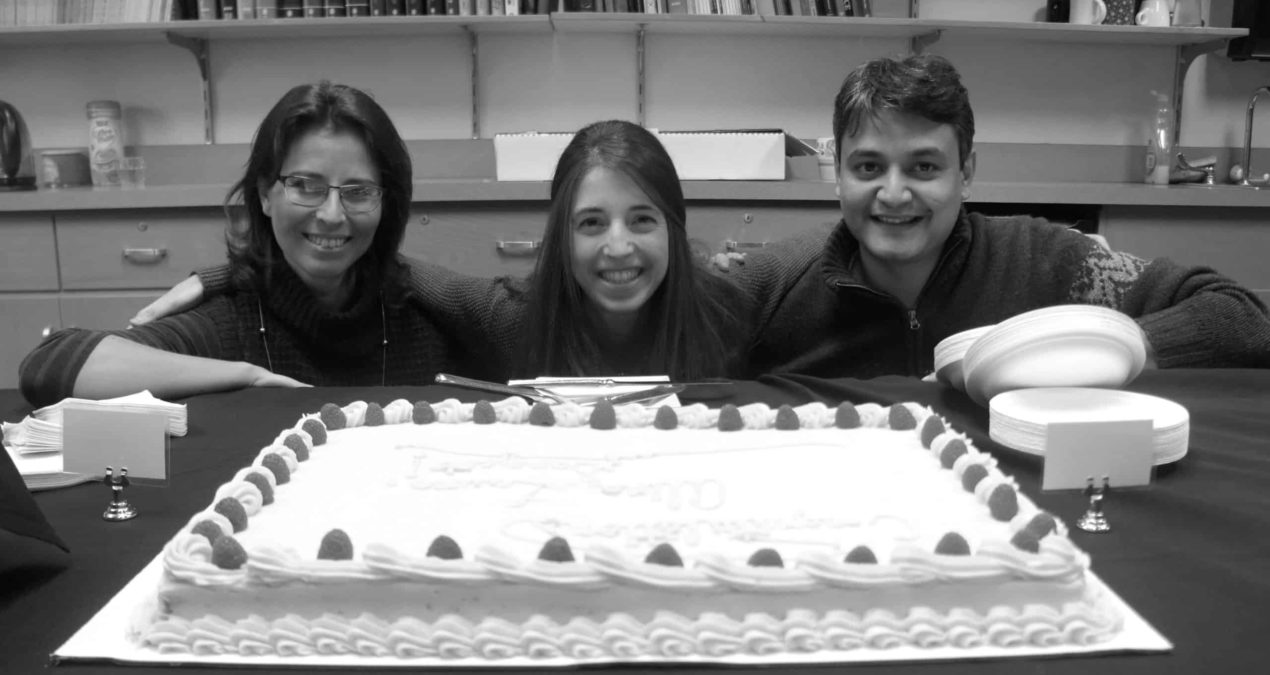TANZEN ANGERT & MARISA HOMBOSKY
Features Editor & Sports Editor
Dr. Sangeet Kumar, along with two of his fellow colleagues, Dr. Alina Haliluc and Dr. Laura Russell, joined the communication department’s tenure club.
To celebrate their accomplishments, the department held an Open House in Hig- ley Hall on Jan. 24 with fruit, cake and refreshments for all to join.
Before the cake was cut, several of the other professors in the department began with kind words about the three and noted their contributions to bettering the department.
Dr. Suzanne Condray, who has been with the communication department since 1980, gave a touching and sincere speech about how thankful she is that department will be in good hands for years to come.
The honorees than all thanked their colleagues in which they all agreed that the department is unique and a welcoming environment that gives support that pushes them to be their best.
In brief summary, to achieve tenure a professor must undergo a six-year probationary period where they must contribute to teaching, research and service.
Half way through there is a three-year review period where the professor ’s work and contributions is looked at to see if they are on track.
One of the honorees, Dr. Sangeet Kumar, who is from New Deli, India came to Deni- son after his newspaper journalism career in New Deli and his academic career, where he earned his M.A at the University of New Mexico and his PhD from the University of Iowa.
Kumar has worked in the communication department since 2010 and has contributed to expanding the media courses offered some of which being Media and Modernity, Global Digital Networks and Critical Cultural Approaches to Advertising.
Kumar ’s classes are highly discussion based classes.
He noted that people learn in different ways but by having classes that are discussion based it forces students to speak up and keep involved in the class material.
Laura Russell has been a professor at Denison for five years, and was awarded tenure alongside the two other communications professors.
When asked how she felt about getting tenure, she said it felt like she was turning 25.
“You know you’re older, but you don’t feel different, yet you know you’re different. It’s interesting… you enter a university knowing that it (tenure) is something that you’re striving for every day that you’re there. There’s this wanting to belong to an institution, and how are you going to mold your identity while you’re there. It’s strange to get it in such a brief amount of time.”
She currently teaches two classes at Denison. Research in Communication is a required class for communication majors where they learn how to research and write in the communication field.
Professor Russell also teaches a 400 level seminar called Person to Person Inspiration.
Getting tenure means so much to her because of the people she’s surrounded by here at Denison University.
“I think part of the reason why tenure means so much to me is because of the community that is there [Denison]. The students in particular really impress me. They have a hunger to do more with their learning than just complete a class. I see that need of wanting to impact people and so the next move for me is to really find out what students want and need and how I can tailor my courses to those needs.”
Russell hopes to develop a course around the communication of mental health.
“I currently serve the organization called Behavioral Healthcare Partners in Newark, Ohio. The organization is for those who are battling mental health and addiction. A lot of people in the county have mental health issues. It’s always something I’ve been passionate about. I think developing a course that has a much greater impact on the community is a direction that I want to be able to with my teaching.”
Professor Russell will most likely take her tenure leave next year and conduct research on the notion of trust during recovery.
She says that due to complexity of trust, it’s such an interesting topic of research to her.
“It’s something that I had a chance to encounter when I was doing my re- search during my pre-tenure leave but didn’t get a chance to dig into the trust aspect. I’ve done previous work on gratitude and forgiveness and I would love to see how trust comes into play as people try to recover, especially from addiction. There’s a lot of distrust of the self, and there’s a lot of distrust of the people around you. I hope to give my time during leave to the ideas of trust in the recovery process,” she said.

